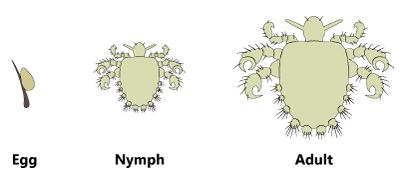Pubic Lice
Pubic lice (also known as "crabs") are tiny insects that live on pubic hair in the genital area of humans and feed on human blood. Pubic lice may sometimes attach to hairs on the legs, chest, armpits, beard, eyebrows, and eyelashes, but rarely on hair on the head (pubic lice are not the same as head lice). Pubic lice are usually spread through close or sexual contact, but are sometimes spread by sharing clothes, bedding, or towels used by someone who has pubic lice. Pubic lice can cause intense itching in the genital area, which may lead to sores. Pubic lice do not spread diseases to humans.

Over-the-counter products and prescription medication are available for the treatment of pubic lice — follow instructions listed on the product label or given by a healthcare provider. To prevent pubic lice, avoid sexual contact with someone who has pubic lice until they have been properly treated. Do not share clothes, bedding, or towels with someone who has pubic lice, and if you have shared these items, wash them in hot water and place them in a clothes dryer on the hot cycle.